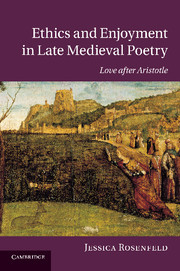Description
Ethics and Enjoyment in Late Medieval Poetry
Love after Aristotle
Cambridge Studies in Medieval Literature Series
Author: Rosenfeld Jessica
Provides an essential ethical history of courtly love poetry by tracing its engagement with the late medieval reception of Aristotelian ethics.
Language: English
Ethics and Enjoyment in Late Medieval Poetry
Publication date: 11-2013
Support: Print on demand
Publication date: 11-2013
Support: Print on demand
Ethics and Enjoyment in Late Medieval Poetry
Publication date: 12-2010
256 p. · 15.9x23.5 cm · Hardback
Publication date: 12-2010
256 p. · 15.9x23.5 cm · Hardback
Description
/li>Contents
/li>Biography
/li>
Jessica Rosenfeld provides a history of the ethics of medieval vernacular love poetry by tracing its engagement with the late medieval reception of Aristotle. Beginning with a history of the idea of enjoyment from Plato to Peter Abelard and the troubadours, the book then presents a literary and philosophical history of the medieval ethics of love, centered on the legacy of the Roman de la Rose. The chapters reveal that 'courtly love' was scarcely confined to what is often characterized as an ethic of sacrifice and deferral, but also engaged with Aristotelian ideas about pleasure and earthly happiness. Readings of Machaut, Froissart, Chaucer, Dante, Deguileville and Langland show that poets were often markedly aware of the overlapping ethical languages of philosophy and erotic poetry. The study's conclusion places medieval poetry and philosophy in the context of psychoanalytic ethics, and argues for a re-evaluation of Lacan's ideas about courtly love.
Introduction: love after Aristotle; 1. Enjoyment: a medieval history; 2. Narcissus after Aristotle: love and ethics in Le Roman de la Rose; 3. Metamorphoses of pleasure in the fourteenth century Dit Amoureux; 4. Love's knowledge: fabliau, allegory, and fourteenth-century anti-intellectualism; 5. On human happiness: Dante, Chaucer, and the felicity of friendship; Coda: Chaucer's philosophical women.
Jessica Rosenfeld is Assistant Professor of English at Washington University, St Louis.
© 2024 LAVOISIER S.A.S.





